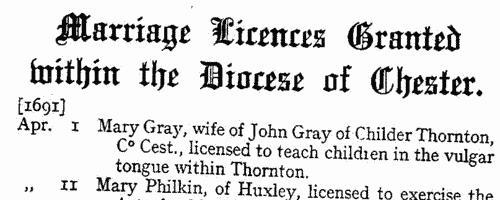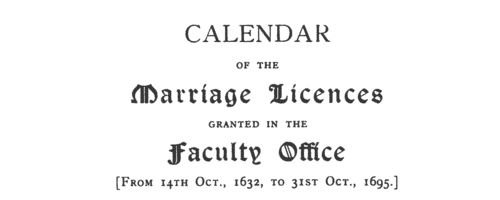Lancashire and Cheshire Marriage Licences
(1616-1624)
Licences for intended marriages in Chester archdeaconry, which covered Cheshire and Lancashire south of the Ribble (by far the most populous part of that county)RYLANCE. Cost: £4.00.  | Sample scan, click to enlarge

|
Lancashire and Cheshire Marriage Licences
(1624-1632)
Licences for intended marriages in Chester archdeaconry, which covered Cheshire and Lancashire south of the Ribble (by far the most populous part of that county)RYLANCE. Cost: £4.00.  | Sample scan, click to enlarge

|
St Albans Archdeaconry Marriage Licences: Bridegrooms
(1639)
Southern Hertfordshire lay in the archdeaconry of St Albans. Marriage licences registered in the archdeaconry act books from 1584 to 1639, and surviving bonds and allegations from 1611 to 1620, 1625 to 1627, 1633 to 1637 and 1661 to 1668 were abstracted by A. E. Gibbs and printed in volume 1 of the Herts Genealogist and Antiquary published in 1895. Both the act books and the bonds normally give full name and parish of bride and groom, and state whether the bride was maiden or widow. A widow's previous married surname is given, not her maiden surname. Occasionally (doubtless when a party was under age) a father's name is given. The later act books sometimes stated at what church the wedding was intended to be celebrated. The marriage bonds give the name of the bondsman or surety. The surety's surname is often the same as the bride or groom, and doubtless in most cases the bondsman was a father or close relative; but a few innkeepers and other tradesmen of St Albans also undertook this duty.RYLANCE. Cost: £4.00.  | Sample scan, click to enlarge

|
Lancashire and Cheshire Marriage Licences
(1667-1680)
Licences for intended marriages in Chester archdeaconry, which covered Cheshire and Lancashire south of the Ribble (by far the most populous part of that county)RYLANCE. Cost: £4.00.  | Sample scan, click to enlarge

|
Lancashire and Cheshire Marriage Licences
(1691-1700)
Licences for intended marriages in Chester archdeaconry, which covered Cheshire and Lancashire south of the Ribble (by far the most populous part of that county). As shown in the sample scan, licences to practise midwifery and to teach are also included. The index covers bondsmen as well as brides and grooms.RYLANCE. Cost: £4.00.  | Sample scan, click to enlarge

|
Licences for marriages in southern England
(1632-1714)
The province or archbishopric of Canterbury covered all England and Wales except for the northern counties in the four dioceses of the archbishopric of York (York, Durham, Chester and Carlisle). Marriage licences were generally issued by the local dioceses, but above them was the jurisdiction of the archbishop. Where the prospective bride and groom were from different dioceses it would be expected that they obtain a licence from the archbishop; in practice, the archbishop residing at Lambeth, and the actual offices of the province being in London, which was itself split into myriad ecclesiastical jurisdictions, and spilled into adjoining dioceses, this facility was particularly resorted to by couples from London and the home counties, although there are quite a few entries referring to parties from further afield. Three calendars of licences issued by the Faculty Office of the archbishop were edited by George A Cokayne (Clarenceux King of Arms) and Edward Alexander Fry and printed as part of the Index Library by the British Record Society Ltd in 1905. The first calendar is from 14 October 1632 to 31 October 1695 (pp. 1 to 132); the second calendar (awkwardly called Calendar No. 1) runs from November 1695 to December 1706 (132-225); the third (Calendar No. 2) from January 1707 to December 1721, but was transcribed only to the death of queen Anne, 1 August 1714. The calendars give only the dates and the full names of both parties. Where the corresponding marriage allegations had been printed in abstract by colonel Joseph Lemuel Chester in volume xxiv of the Harleian Society (1886), an asterisk is put by the entry in this publication. The licences indicated an intention to marry, but not all licences resulted in a wedding. RYLANCE. Cost: £4.00.  | Sample scan, click to enlarge

|
 Masters and Apprentices
(1717) Masters and Apprentices
(1717)
Apprenticeship indentures and clerks' articles were subject to a 6d or 12d per pound stamp duty: the registers of the payments usually give the master's trade, address, and occupation, and the apprentice's father's name and address, as well as details of the date and length of the apprenticeship. 1 January to 8 November 1717.RYLANCE. Cost: £8.00.  | Sample scan, click to enlarge

|
City of London: Merchant Taylors
(1724)
A list of the members of the several London livery companies that polled for Edward Bellamy esquire to be sheriff for the city of London and county of Middlesex for the remaining part of the year, published 16 March 1724. Full names are given, surname first, arranged roughly alphabetically by company.RYLANCE. Cost: £6.00.  | Sample scan, click to enlarge

|
 Masters and Apprentices
(1730) Masters and Apprentices
(1730)
Apprenticeship indentures and clerks' articles were subject to a 6d or 12d per pound stamp duty: the registers of the payments usually give the master's trade, address, and occupation, and the apprentice's father's name and address, as well as details of the date and length of the apprenticeship. 16 March to 31 December 1730.RYLANCE. Cost: £8.00.  | Sample scan, click to enlarge

|
 Masters and Apprentices
(1742) Masters and Apprentices
(1742)
Apprenticeship indentures and clerks' articles were subject to a 6d or 12d per pound stamp duty: the registers of the payments usually give the master's trade, address, and occupation, and the apprentice's father's name and address, as well as details of the date and length of the apprenticeship. 1 January to 31 December 1742RYLANCE. Cost: £8.00.  | Sample scan, click to enlarge

|
Research your ancestry, family history, genealogy and one-name study by direct access to original records and archives indexed by surname.













